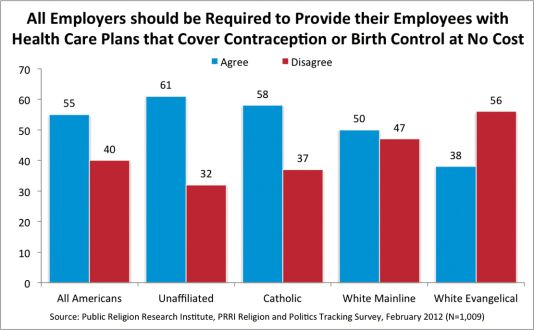The Obama administration is calling for health insurance companies to offer birth control without copay. Many religious leaders are up in arms and say that the government is intruding into matters of conscience. On the other side, Illinois Rep. Jan Schakowsky said last week, “Women’s health care should not depend on who the boss is.” Well, try telling that to the Catholic bishops or to some other Christian organizations. They feel that if the boss is God, well then it certainly makes a difference.
To some, sexual activity is a personal choice independent of any other factor. To others, it is a commitment to God. Getting both sides to agree, as we have seen, is almost downright impossible. All we know is that it is possible that our Catholic college, Cabrini, and other religious institutions, at some point may have to offer birth control at no additional cost to students and employees under the health insurance plans.
We understand that one’s faith and conscience should be free of government interference. After all, a guiding principle for our forefathers was separation of church and state. Some see this move by President Obama as disregarding the rights of private organizations to make decisions based on their religious beliefs.
However, if this rule were to be enacted and Cabrini’s health insurance had to offer no-copay birth control, people who oppose the provision can take comfort in the fact that birth control will not be forced on individuals. It is still a personal choice.
Obviously, there are differences between public and religious colleges and universities. For us students, it seems clear that our campus is not able to sell any form of contraceptive, such as condoms or free pills, while some public schools in Pennsylvania and all throughout the country even sell Plan B, the morning-after pill, out of vending machines. We understand that any institution that is religiously affiliated does not want to present the image of supporting pre-marital sex, as it is a sin according to the Church, period. Many believe that selling condoms or offering free contraceptives would send the wrong message to young, impressionable students. They have a right to feel this way, but perhaps it is time to understand that most people of our generation are going to make their own decisions regarding sex regardless of religion. Therefore, if a school cares about protecting, maybe it is time to start providing.
The Catholic Church is about protecting life, all life, from the moment of conception until death; the implication is that abortion is a mortal sin. While pre-marital sex and the use of contraceptives are both considered a sin, most Catholics would agree they are minor compared to abortion. If college students are going to engage in sex anyway, which many are, we believe a Catholic institution should do everything in its power to show students that abortion is not the answer. Maybe that’s a backwards way of thinking, but maybe at the same time it isn’t.According to an article published in the New York Times on Jan. 29 by Denise Grady, “surveys have found that 98 percent of sexually active Catholic women, as in the general population, have used contraceptives.”
Because this is an election year, it is important to note where the different candidates stand on this issue. Mitt Romney believes this is an attack on religious freedom and it would not stand during his presidency. Newt Gingrich and Rick Santorum do not believe health insurance should cover birth control and they both propose outlawing certain contraceptives.
It is possible that this proposition may not even ever become reality for places such as Cabrini. However, do not expect it to go away because it will just be one of many controversial issues in this coming election.



